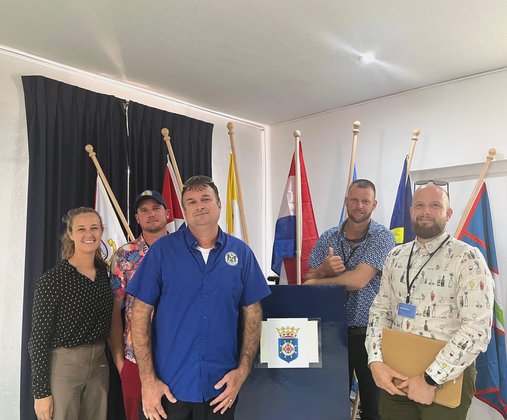With over fifty participants, the conference focused on knowledge exchange and ways to strengthen collaboration among the 6 islands of the Dutch Caribbean in fields of agriculture, livestock and fisheries, which makes up the primary sector.
The conference was opened with speeches by Island Governor of Bonaire John Soliano, Commissioner Anjelica Cicilia, who is responsible for agricultural affairs, fisheries and food security, and DCALFA President Nathalie Maduro from Aruba and DCALFA Vice President Shervin Frederick from Sint Maarten. Their speeches centered around the importance of the islands working together in order to achieve food security through shared (local) knowledge, best practices and learned experience. The need for food security is greater now than ever, given the reality of climate change and the islands’ high dependency on imports.
Launch of DCALFA website: Bridging islands, cultivating growth
A major milestone highlighted during this conference was the launch of the DCALFA website, which was developed with funding made available by the local government of Bonaire. The aim of this website is to centralize information related to the topics of agriculture, livestock and fisheries across the six islands, with each island and its initiatives in the primary sector being highlighted. It can also be used as a tool from which valuable information can be easily sourced, such as funding opportunities.
Saba Representation
Representing Saba from the Public Entity were Department Head of Agriculture Randall Johnson, Project Manager Justin Simmons-de Jong, and Project Leader Niké Dekkers. Funding was made available by the Netherlands Ministry of Agriculture, Fisheries, Food Security and Nature (LVVN) and the Ministry of Economic Affairs (EZ) for each island to bring to the conference a fisher, a farmer or entrepreneur in the primary sector. Local fisherman Ryan Hassell and farmer-entrepreneur Luke Hassell attended the conference through this sponsorship and were able to take part in the discussions on agriculture, livestock and fisheries, contributing significantly as they shared their perspectives of an active fisher and farmer.
Conference activities
The second day of the conference consisted of field trips, where attendees were given the opportunity to see different initiatives being carried out on Bonaire in the primary sector. Attendees visited livestock and horticulture farms, fisherman’s market, Cadushy Distillery, the tree nursery of Terra Barra reforestation project and the various projects taking place on the grounds of the OLB’s Department of Agriculture, Livestock and Fisheries. The Saba delegation also took part in multiple workshops, focusing on topics, such as data collection and innovation within the primary sector, food security in a changing climate and best practices from fisheries, agriculture and animal husbandry on the six Dutch Caribbean islands. Presentations were also given by several experts, including Special Envoy Edison Rijna, who shared information on funding opportunities from the EU.
Shared commitment to food security
The conference marks the continued commitment of all six islands to promote collaboration and to share best practices in order to strengthen self-reliance. On the last day, each island planted a fruit tree on the grounds of the OLB’s LVV to symbolize their commitment to working together to achieve food security through the platform of the Dutch Caribbean Agriculture, Livestock and Fisheries Alliance. Saba’s tree was planted by Justin Simmons-de Jong and Niké Dekkers. It was announced that the next conference will be held in St. Maarten, in keeping with the tradition that the conference will be held on a different Dutch Caribbean island each year. The renewal of the MOU between all six islands on working together to achieve food security will take place in the next conference. In the coming year, the groundwork will be laid by all islands to ensure continued collaboration.




